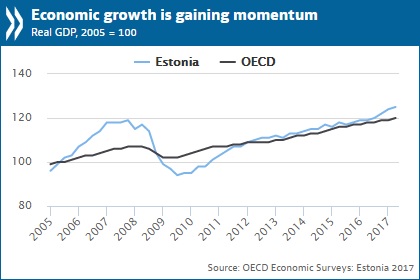Estonia: Policy action is needed for stronger and more inclusive growth
The Estonian economic outlook is improving, with growth gaining momentum, wages increasing and resilient export performance. It is now time to make growth stronger, greener and more inclusive, according to a new report from the OECD.

The latest OECD Economic Survey of Estonia expects the economy to grow by more than four percent this year. It lays out a range of policy options for renewing the growth drivers across the economy and reducing poverty and inequalities.
The Survey, presented in Tallinn by OECD Secretary-General Ángel Gurría and Estonian Minister of Health and Labour Jevgeni Ossinovski, identifies priority areas for future action, including new measures to improve the long-term potential of the economy, make growth more inclusive, deepen integration into global trade, and unleash productive investment.
“Estonia has made great strides in increasing incomes and well-being, largely through sound macroeconomic policies and open, outward-looking engagement with the world economy,” Mr Gurría said. “With the pace of recovery increasing and public finances in an enviable position, conditions are right for confronting the long-term challenges to ensuring sustainable growth. Investing more in social protection and health, education and protecting the environment will lead to a more productive and brighter future for all Estonians.”
The Survey says that sustained economic and social progress will hinge on renewed efforts to reduce inequality and poverty (at 15.5%, compared to OECD average of 11.5%). An adequate social safety net should be implemented, including increased spending on subsistence benefits, relaxed eligibility conditions for unemployment benefits, extended parental leave for fathers and new obligations on employers to reduce occupational health and safety risks.
Given Estonia’s prudent fiscal policy - public debt is the lowest in the 35-member OECD at around 10% of GDP (EU Maastricht definition) – the Survey sees “fiscal space” for greater public investment to boost growth potential and make it both greener and more inclusive. There is also scope for making the tax-benefit system more redistributive and setting tax rates on oil shale, vehicle and energy use at levels that better reflect the environmental damages generated.
The Survey focuses on key channels for fostering long-term growth and inclusiveness. These include raising investment, further integrating into global trade and easing labour-market bottlenecks. Estonia should prioritise policies to address the growing skills shortage. This should include a greater focus on the quality of and participation in adult education; more attention to child care services and the sharing of childcare duties between men and women in order to ensure that women have equal opportunities in the work force; and improving the country’s attractiveness for skilled migrants.
Actions to improve the business environment – such as completion of work on a “one-stop shop” for administrative formalities, creation of a centralised credit bureau with positive and negative information on creditors, reforming insolvency regime and better cooperation mechanisms between public sector R&D institutions and the private sector – would improve incentives to both trade and investment.
Source: Organization for Economic Co-operation and Development
- 333 reads
Human Rights
Fostering a More Humane World: The 28th Eurasian Economic Summi

Conscience, Hope, and Action: Keys to Global Peace and Sustainability

Ringing FOWPAL’s Peace Bell for the World:Nobel Peace Prize Laureates’ Visions and Actions

Protecting the World’s Cultural Diversity for a Sustainable Future

Puppet Show I International Friendship Day 2020

